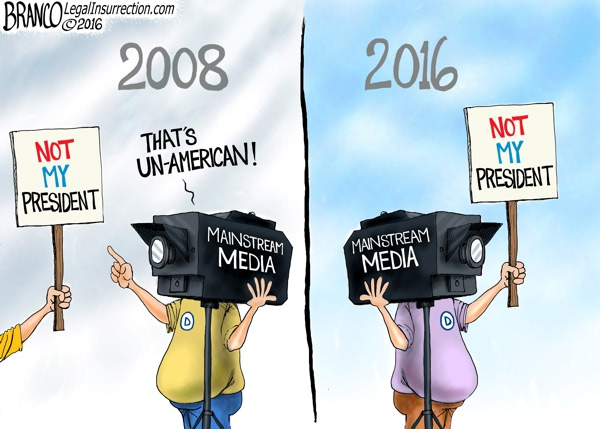News Story of the Day: proponents of Fight for $15 plan a day of disruption. They think for some reason that their national protests, demonstrations and complaining will result in higher wages. But what they don’t realize is that companies were already adapting to the mandated higher wages by phasing out human employees in favor of self-serve kiosks.
McDonald’s confirmed recently that it plans to install service kiosk ordering, mobile payments, “smart” menu boards, custom sandwiches and table service at more than 14,000 restaurants in the United States. Interestingly enough, the kiosks will be rolled out first in states with the highest minimum wages.
Although the kiosks will cost $50,000, it will be a lot cheaper in the long-term than hiring workers who are paid $15 an hour for a job that takes 60 minutes to learn.
Ostensibly, Tom Woods was right when he said “this will give their employers more time to install self-service kiosks” when these workers are out on the streets protesting.
Chart of the Day: despite the prognostications of doom and gloom from nearly everyone, it seems Wall Street is digging a Donald Trump presidency. According to a new chart from Bloomberg, hedge funds, which overwhelmingly supported Hillary Clinton for president this year, are seeing tremendous returns from a President-Elect Trump. Here is the chart:

Illustration of the Day: a couple of years after Barack Obama was elected president, the Tea Party formed, and groups of conservatives protested Washington’s reckless ways. At the time, the mainstream media decried and vilified anyone who said that Obama was “not my president” or had chastized his administration up to that point. Well, the media are now applauding those who are doing the exact same thing to Donald Trump, who hasn’t even been sworn in yet! This illustration sums it up perfectly:

Quote of the Day: Thanksgiving is probably the greatest holiday of the year. What makes it an amazing experience is the power of the invisible hand. The farmers, the candles, the dining tables, the airplanes and others all contributed to the wonderful experience this Thanksgiving. In 2003, Boston Globe columnist Jeff Jacoby highlighted this very fact in an impeccable op-ed piece (if only most people would recognize this):
Isn’t there something wondrous — something almost inexplicable — in the way your Thanksgiving weekend is made possible by the skill and labor of vast numbers of total strangers?
To bring that turkey to the dining room table required the efforts of thousands of people — the poultry farmers who raised the birds, of course, but also the feed distributors who supplied their nourishment and the truckers who brought it to the farm, not to mention the architect who designed the hatchery, the workmen who built it, and the technicians who keep it running. The bird had to be slaughtered and defeathered and inspected and transported and unloaded and wrapped and priced and displayed. The people who accomplished those tasks were supported in turn by armies of other people accomplishing other tasks — from refining the gasoline that fueled the trucks to manufacturing the plastic in which the meat was packaged.
The activities of countless far-flung men and women over the course of many months had to be intricately choreographed and precisely timed, so that when you showed up to buy a fresh Thanksgiving turkey, there would be one — or more likely, a few dozen — waiting. The level of coordination that was required to pull it off is mind-boggling. But what is even more mind-boggling is this: No one coordinated it.
No turkey czar sat in a command post somewhere, consulting a master plan and issuing orders. No one forced people to cooperate for your benefit. And yet they did cooperate. When you arrived at the supermarket, your turkey was there. You didn’t have to do anything but show up to buy it. If that isn’t a miracle, what should we call it?
Adam Smith called it “the invisible hand” — the mysterious power that leads innumerable people, each working for his own gain, to promote ends that benefit many. Out of the seeming chaos of millions of uncoordinated private transactions emerges the spontaneous order of the market. Free human beings freely interact, and the result is an array of goods and services more immense than the human mind can comprehend. No dictator, no bureaucracy, no supercomputer plans it in advance. Indeed, the more an economy is planned, the more it is plagued by shortages, dislocation, and failure.
It is commonplace to speak of seeing God’s signature in the intricacy of a spider’s web or the animation of a beehive. But they pale in comparison to the kaleidoscopic energy and productivity of the free market. If it is a blessing from Heaven when seeds are transformed into grain, how much more of a blessing is it when our private, voluntary exchanges are transformed – without our ever intending it – into prosperity, innovation, and growth?
Video of the Day: this year’s Black Friday seemed uncommonly calm. But it wasn’t always like this. Let’s take a look at last year’s madness that unfolded around the world in the compilation clip below:
People need to speak with their dollars. I will never use a kiosks or self checkout. They are both jobs killers. If people would just not use the kiosks, they would go away. If McD’s goes totally robotic, I will not be buying from them. I was at a McD’s with a kiosks in OK (not a high minimum wage state) and you can still order at the counter. The day there is no longer a person to take and fill my order is the day I buy from someone else.